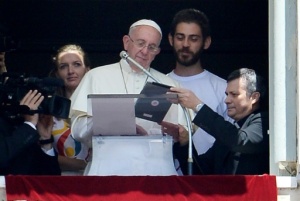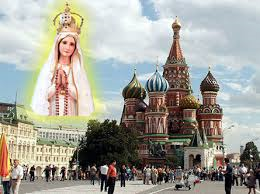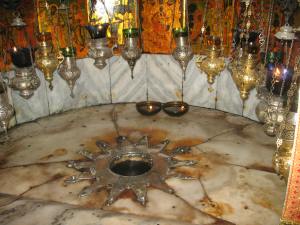“The prayer of the Church venerates and honors the Heart of Jesus . . . which, out of love for men, he allowed to be pierced by our sins.”2
Devotion to the Sacred Heart of Jesus is of great antiquity in the Church. It was St. Margaret Mary Alacoque, however, who made this devotion widespread. In 1675, within the octave of the feast of Corpus Christi, our Lord appeared to her and said: “Behold this heart which, not withstanding the burning love for men with which it is consumed and exhausted, meets with no other return from most Christians than sacrilege, contempt, indifference and ingratitude, even in the sacrament of my love [the Eucharist]. But what pierces my heart most deeply is that I am subjected to these insults by persons especially consecrated to my service.”3
To those who show him love and who make reparation for sins, however, our Lord made a great pledge: “I promise you in the unfathomable mercy of my heart that my omnipotent love will procure the grace of final penitence for all those who receive communion on nine successive first Fridays of the month; they will not die in my disfavor, or without having received the sacraments, since my divine heart will be their sure refuge in the last moments of their life.”4
The great promise of the Sacred Heart is most consoling: the grace of final perseverance and the joy of having Jesus’ heart as our sure refuge and infinite ocean of mercy in our last hour.
To gain this grace, we must:
-
Receive holy Communion on nine consecutive first Fridays.
-
Have the intention of honoring the Sacred Heart of Jesus and of reaching final perseverance.
-
Offer each holy Communion as an act of atonement for offenses against the Blessed Sacrament.
Introductory Prayer
Almighty and everlasting God, look upon the heart of your well-beloved Son and upon the praise and satisfaction which he offers to you in the name of all sinners; and grant them pardon when they seek your mercy. We ask this in the name of Jesus Christ, your Son, who lives and reigns with you for ever and ever.
R. Amen.
Reading: Jn 19:31-37
Since it was the day of Preparation, in order to prevent the bodies from remaining on the cross on the Sabbath (for that Sabbath was a high day), the Jews asked Pilate that their legs might be broken, and that they might be taken away. So the soldiers came and broke the legs of the first, and of the other who had been crucified with him; but when they came to Jesus and saw that he was already dead, they did not break his legs. But one of the soldiers pierced his side with a spear, and at once there came out blood and water.
He who saw it has borne witness-his testimony is true, and he knows that he tells the truth-that you also may believe. For these things took place that the scripture might be fulfilled, “Not a bone of him shall be broken.” And again another scripture says, “They shall look on him whom they have pierced.”
Considerations5
1. Love is revealed to us in the Incarnation, the redemptive journey which Jesus Christ made on our earth, culminating in the supreme sacrifice of the cross. And on the cross it showed itself through a new sign: “One of the soldiers pierced his side with a spear, and at once there came out blood and water.” This water and blood of Jesus speak to us of a self-sacrifice brought to the last extreme: “It is finished”-everything is achieved, for the sake of love. . . .
The fullness of God is revealed and given to us in Christ, in the love of Christ, in Christ’s heart. For it is the heart of him in whom “the whole fullness of deity dwells bodily.” Were one to lose sight of this great plan of God-the overflow of love in the world through the Incarnation, the Redemption and Pentecost-he could not understand the refinement with which our Lord deals with us.
2. Let us realize all the richness hidden in the words “the Sacred Heart of Jesus.” When we speak of a person’s heart, we refer not just to his sentiments, but to the whole person in his loving dealings with others. In order to help us understand divine things, Scripture uses the expression “heart” in its full human meaning, as the summary and source, expression and ultimate basis, of one’s thoughts, words and actions. One is worth what one’s heart is worth. . . .
So, when we talk about the heart of Jesus, we stress the certainty of God’s love and the truth of his commitment to us. When we recommend devotion to the Sacred Heart, we are recommending that we should give our whole selves to Jesus, to the whole Jesus-our souls, our feelings and thoughts, our words and actions, our joys.
That is what true devotion to the heart of Jesus means. It is knowing God and ourselves. It is looking at Jesus and turning to him, letting him encourage and teach and guide us. The only difficulty that could beset this devotion would be our own failure to understand the reality of an incarnate God.
3. Jesus on the cross, with his heart overflowing with love for us, is such an eloquent commentary on the value of people and things that words only get in the way. Men, their happiness and their lives, are so important that the very Son of God gave himself to redeem and cleanse and raise them up. “Who will not love this heart so wounded?” a contemplative asks in this connection. “Who will not return love for love? Who will not embrace a heart so pure? We, who are made of flesh, will repay love with love. We will embrace our wounded One, whose hands and feet ungodly men have nailed; we will cling to his side and to his heart. Let us pray that we be worthy of linking our heart with his love and of wounding it with a lance, for it is still hard and impenitent. . . .”
But note that God does not say: “In exchange for your own heart, I will give you a will of pure spirit.” No, he gives us a heart, a human heart, like Christ’s. I don’t have one heart for loving God and another for loving people. I love Christ and the Father and the Holy Spirit and our Lady with the same heart with which I love my parents and my friends. I shall never tire of repeating this. We must be very human, for otherwise we cannot be divine. . . .
If we don’t learn from Jesus, we will never love. If, like some people, we were to think that to keep a clean heart, a heart worthy of God, means “not mixing it up, not contaminating it” with human affection, we would become insensitive to other people’s pain and sorrow. We would be capable of only an “official charity,” something dry and soulless. But ours would not be the true charity of Jesus Christ, which involves affection and human warmth. In saying this, I am not supporting the mistaken theories-pitiful excuses-that misdirect hearts away from God and lead them into occasions of sin and perdition. . . .
4. But I have still a further consideration to put before you. We have to fight vigorously to do good, precisely because it is difficult for us to resolve seriously to be just, and there is a long way to go before human relations are inspired by love and not hatred or indifference. We should also be aware that, even if we achieve a reasonable distribution of wealth and a harmonious organization of society, there will still be the suffering of illness, of misunderstanding, of loneliness, of the death of loved ones, of the experience of our own limitations.
Faced with the weight of all this, a Christian can find only one genuine answer, a definitive answer: Christ on the cross, a God who suffers and dies, a God who gives us his heart opened by a lance for the love of us all. Our Lord abominates injustice and condemns those who commit it. But he respects the freedom of each individual. He permits injustice to happen because, as a result of original sin, it is part and parcel of the human condition. Yet his heart is full of love for men. Our suffering, our sadness, our anguish, our hunger and thirst for justice . . . he took all these tortures on himself by means of the cross. . . .
Suffering is part of God’s plans. This is the truth, however difficult it may be for us to understand it. It was difficult for Jesus Christ the man to undergo his passion: “Father, if you are willing, remove this cup from me; nevertheless, not my will, but yours, be done.” In this tension of pleading and acceptance of the Father’s will, Jesus goes calmly to his death, pardoning those who crucify him.
This supernatural acceptance of suffering was, precisely, the greatest of all conquests. By dying on the cross, Jesus overcame death. God brings life from death. The attitude of a child of God is not one of resignation to a possibly tragic fate; it is the sense of achievement of someone who has a foretaste of victory. In the name of this victorious love of Christ, we Christians should go out into the world to be sowers of peace and joy through everything we say and do. We have to fight-a fight of peace-against evil, against injustice, against sin. Thus do we serve notice that the present condition of mankind is not definitive. Only the love of God, shown in the heart of Christ, will attain our glorious spiritual triumph.
1. Cf. Catechism of the Catholic Church (=CCC), 667, 2664, 2665.
2. Cf. CCC, 2669.
3. St. Margaret M. Alacoque, Autobiography (=MMAA).
4. Ibid.
5. Saint Josemaría Escrivá, “Finding Peace in the Heart of Christ,” 162-170, Princeton, N.J.: Scepter Publishers,1974. Footnotes used by the author in the original homily are omitted.
….
Taken from: http://www.catholicnewsagency.com/resources/prayers/devotions/to-our-lord-jesus-christ/first-friday-devotion/



